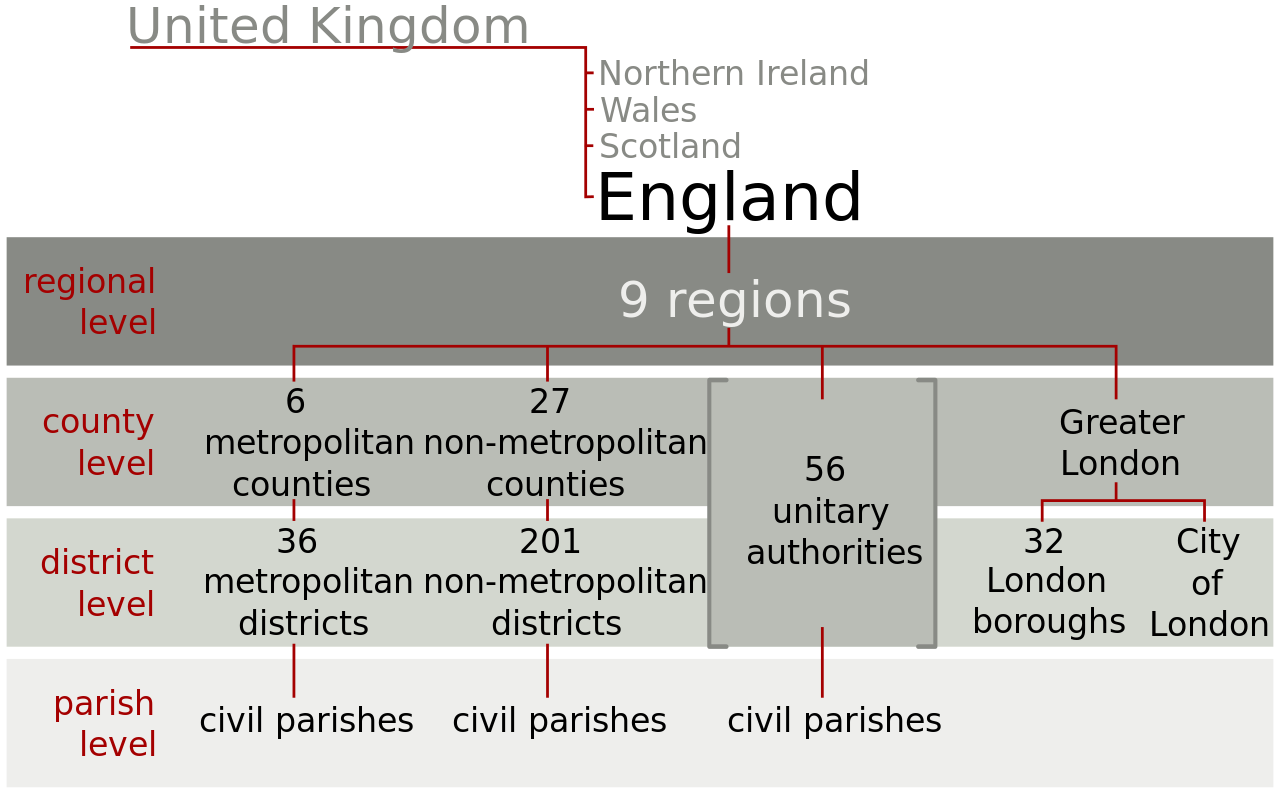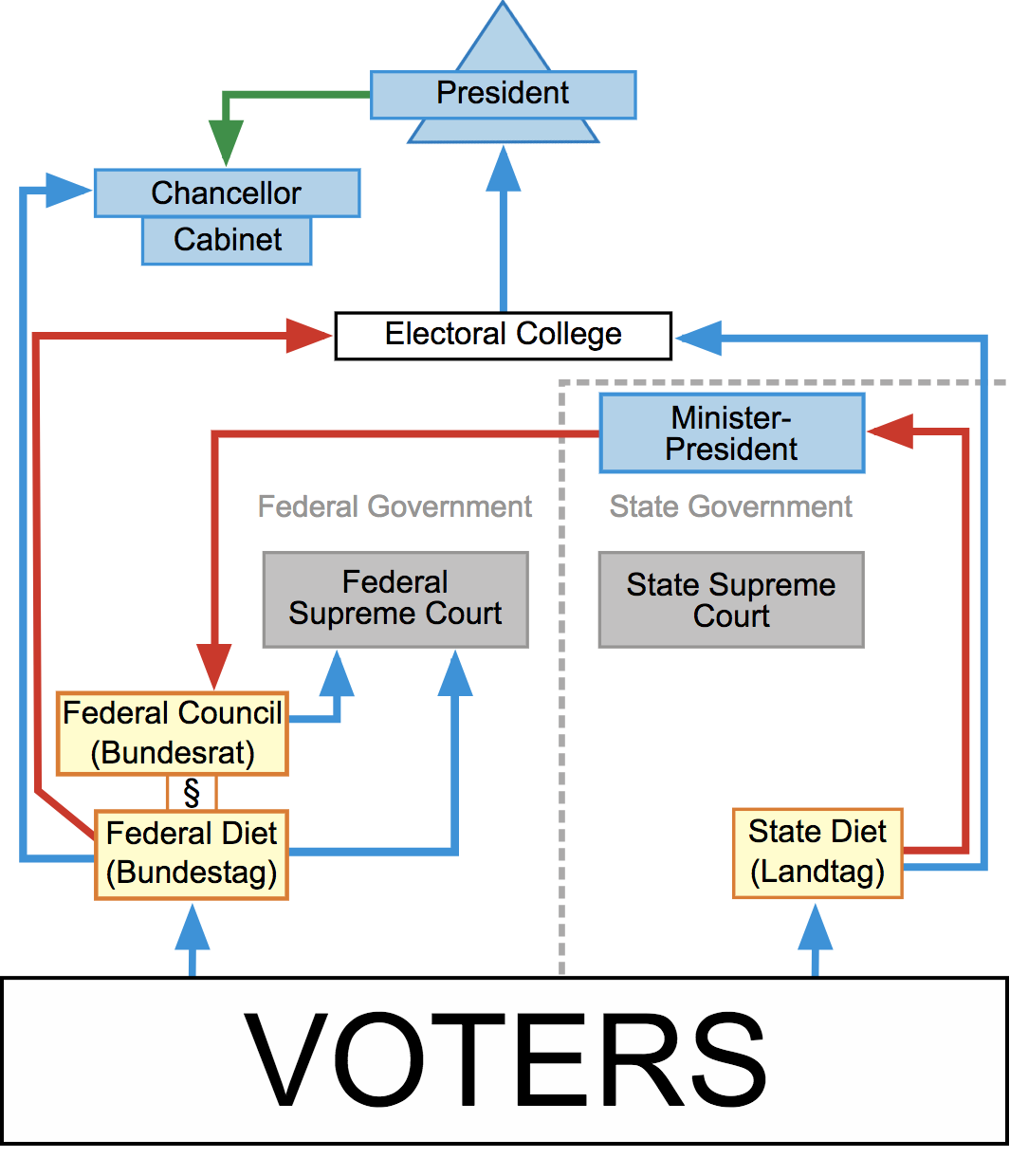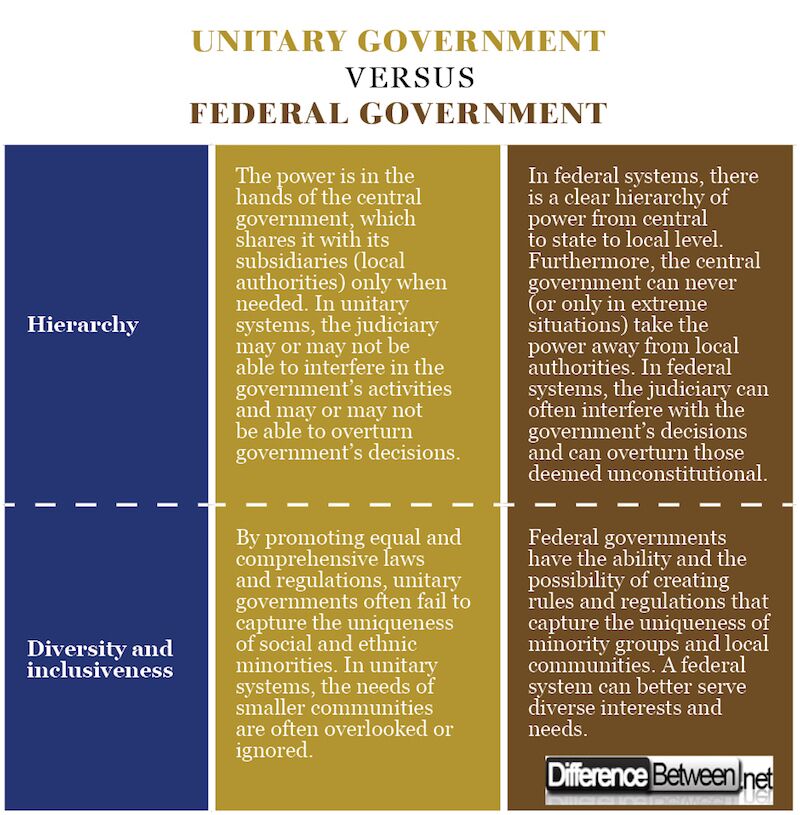Difference Between Unitary Government and Federal Government
One of the main distinction among types of governments is between unitary and federal systems. Both systems can refer to democratic or monarchic governments, but they are intrinsically different. As the name suggests, the unitary government entails the centralization of power in the hands of the central government, which does not delegate tasks and responsibilities to other members of the state. Conversely, in a federal system, regions and provinces enjoy a higher degree of autonomy. In today’s world, we see various examples of both systems working and ensuring stability and prosperity. For instance, the United States and Switzerland are two examples of the efficiency of the federal system (while in Sudan and Pakistan such system is not as efficient), whereas Italy and Norway have successful unitary governments. To date, most governments are unitary, while there are currently 27 federal systems.

What is Unitary Government?
A unitary government can be both a democracy and a monarchy. In both cases, the power is concentrated in the hands of the central government, while provinces and regions do not enjoy large autonomy. The underlying principle of any unitary government is the idea of unity. If the power is in the hands of few (even if those few are elected by the population), it is easier to create cohesive and equal laws and norms that apply to all citizens (in all parts of the country) without discrimination.
Some believe that citizens do not have much say in unitary systems, but this is not always true. In unitary democracies, like Italy, South Korea, Portugal, France and Finland, citizens have the right to express their opinions and the government is elected by the people. Even in monarchic systems like Spain, Sweden and Denmark, the interests of the population are always taken in high consideration. Freedom of speech and liberty of movements are (or should be) always respected in such countries and citizens have the possibility to protest against their government if they wish so. Yet, at the same time, it is easier for a unitary government to turn into an authoritarian regime or a dictatorship, and rulers have the possibility of creating and eliminating rules and laws in a much quicker way than in a federal system.
What is Federal Government?
In a federal system, regions and provinces enjoy a higher degree of autonomy. The largest federation in the world is the United States. In this case, the 50 states enjoy autonomy and even have different laws and regulations on a number of matters. Yet, at the same time, they remain linked and subject to the decisions of the central government. In a federal system, provinces and regions have the possibility of creating laws and regulations that better capture the needs and unicity of specific areas.

Yet, some powers always remain in the hands of the central government, including:
- International diplomacy;
- Foreign affairs:
- Decision to start or end a war;
- National security;
- Taxes;
- National budget; and
- Immigration policies.
The link between local authorities and central government is usually very strong, although not all federal systems work in the same way. Of the 27 federations existing today, most are republics and democracies (i.e. United States, Switzerland, India, Brazil, etc.) but there are also some monarchies, such as Canada, Belgium and Australia.
Similarities between Unitary and Federal Government
Although the unitary and federal government are very different and are based on contrasting principles, we can identify few common aspects between the two systems:
1) The unitary and the federal government can be both monarchies and democracies. Although the unitary system is more suitable for a monarchy (the power is concentrated in the hands of the ruling family), most modern monarchies (i.e. United Kingdom, Australia, Canada, etc.) employ a federal system;
2) In both cases, the central government maintains control over key issues. Even in federations, in fact, the central government is in charge of international relations and diplomacy, taxes, budget allocation and national security; and
3)Both system can promote stability and prosperity. The unitary government does so by promoting equality and cohesion across the nation, while the federal government does so by promoting specific regulations that better capture local needs and that are more suitable for minority groups.
Difference between Unitary Government and Federal Government
The debate on unitary and federal governments has been explored by scholars and academics, and has been reinterpreted by Arend Lijphart who mainly focused on democratic systems, and analyzed the difference between Westminster and Consensus democracies.
The first term refers to the majoritarian model exemplified by the British parliamentary and governmental institutions. This system is based on the concentration of the executive power in the hands of one party, cabinet dominance, a majoritarian and disproportional system of elections, a unitary and centralized government, constitutional flexibility and the state’s control over the central bank.
Conversely, the second term refers to a different model of democracy characterized by executive power-sharing in broad coalitions, a multiparty system, proportional representations, federal and decentralized government, constitutional rigidity, and an independent central bank. And that is, therefore, more adapt for heterogeneous societies. In other words, Lijphart analyzed the difference between unitary and federal democracies. If we broaden the scope of the comparison, we can identify more differences between the two:
1) Efficiency of Unitary Government and Federal Government: some believe that a unitary and cohesive country is more efficient and that a centralized government is able to make decisions and implement laws and regulations in a more effective manner. At the same time, others argue that a decentralized system can respond to the needs of all citizens in a more adequate way. Indeed, in unitary systems, the decision-making process is faster and (often) smoother, but, at the same time, there might be less transparency. Unitary governments do not have duplications (whereas federal systems do) and reduce bureaucratic and administrative processes to the minimum. Conversely, federal systems tend to take longer to make decisions, to adopt or reject new laws, and to implement political and social changes;
2) Participation of Unitary vs. Federal Government: in a unitary democracy (as well as in some modern monarchies), citizens have the possibility of electing their representatives and popular participation is allowed and promoted by the government itself. Yet, federal systems allow for a broader popular engagement. For instance, in most federal republics, citizens can elect their representatives at a local and state level but can also participate in the election of the president or head of the state;
3) “Involvement in the economy” of Unitary and Federal Government: the degree of governmental involvement in the economy varies from country to country. In some cases, federal systems allow for more autonomy even in the economic sphere, while on other cases the central government uses its local subsidiaries to keep a closer look on private businesses. In general, private entrepreneurship tends to be more challenging in unitary states.
Unitary vs Federal Government: Comparison chart
Building on the differences outlined in the previous section, we can identify few other aspects that differentiate federal and unitary governments.

Summary of Unitary vs. Federal Government
Federal and unitary governments are two of the most common ways in which countries can be organized. While in a unitary system the power is concentrated in the hands of the central government, in a federal system power and authorities are shared among central, regional and local authorities. The two systems are based on different principles. The unitary government aims at creating a cohesive and unified country, whereas the federal system creates laws and regulations that better capture the needs and interests of local communities. Both federal and unitary governments can be either democracies or monarchies, although the unitary system is often associated with a more authoritarian type of governance, while the federal system is often associated with democratic ideals. Today, most countries have unitary governments but there are 27 federal governments all across the world, with the United States being the most famous example.
- Difference Between Michelle Obama and Melania - January 29, 2019
- Difference Between Trump and Modi - December 4, 2018
- Difference Between Carbon Tax And Cap And Trade - December 4, 2018
Search DifferenceBetween.net :
Leave a Response
References :
[0]Image Credit: https://upload.wikimedia.org/wikipedia/commons/6/66/German_Political_System_2.svg
[1]Image Credit: https://upload.wikimedia.org/wikipedia/commons/thumb/6/6a/England_administrative_divisions_since_2009.svg/1280px-England_administrative_divisions_since_2009.svg.png
[2]Cerniglia, Floriana. "Decentralization in the public sector: quantitative aspects in federal and unitary countries." Journal of Policy Modeling 25.8 (2003): 749-776
[3]Lijphart, Arend. Patterns of democracy: Government forms and performance in thirty-six countries. Yale University Press, 2012
[4]Pennock, J. Roland. "Federal and unitary government—disharmony and frustration." Systems Research and Behavioral Science 4.2 (1959): 147-157
